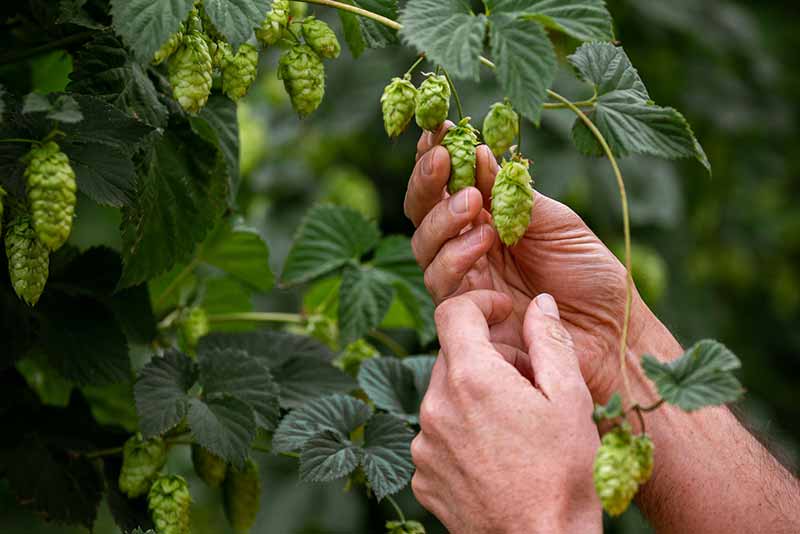
It’s no secret that IPAs are what consumers want. Untappd check-in data from 2022 verifies that with the top four styles, all of the hop-forward variety.
Finding the right hop and how to brew with it to accentuate its flavor and aroma for the best version of an IPA—whether it’s a double IPA, American, New England-style hazy, or even a Cold IPA—sets each beer apart.
One popular hop that has continually produced tremendous flavors in IPAs nationwide is Galaxy, a varietal from Australia. Hop Products Australia provides about two percent of the world’s hops, and of those, Galaxy remains the top-produced varietal, according to HPA’s latest crop report.
We spoke with HPA Head of Sales and Marketing Owen Johnston, who provides insights on the plant, where to use it in your beer, and what makes it one of the most explosive hops on the market today.
Affordable, Industry-Leading Brewery Software
What Is the Ancestry of Galaxy Hops?
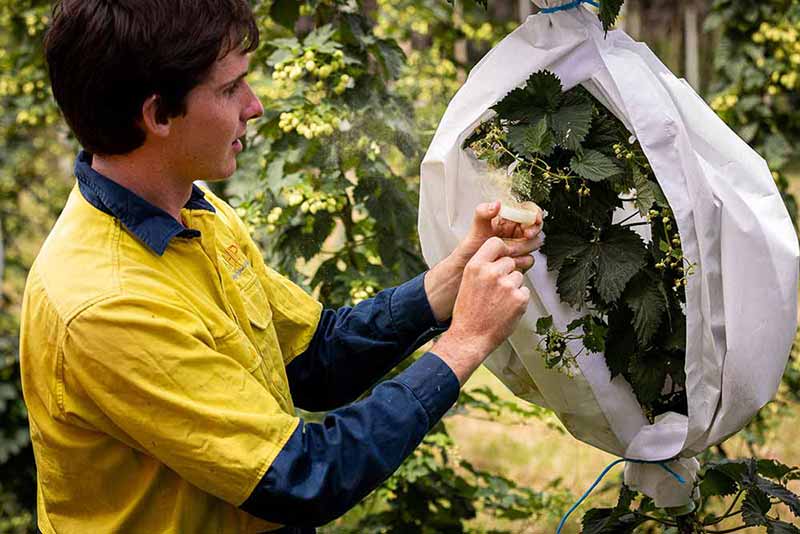
Photography courtesy of Natalie Mendham | Hop Products Australia
HPA created Galaxy hops through the company’s breeding program nearly thirty years ago in 1994, through cross-pollination of high-alpha Australian and Perle parents.
While still high in alpha, the decades-old breeding program had transitioned to more outcomes with more appeal to the nose.
“We get to the 1990s, and the program is starting to move to this focus on aroma,” Johnston says.
HPA took 195 seeds and deployed sixty-seven in the field—forty-six of which were female—one resulting in the creation of Galaxy, the company says.
Johnston says the Galaxy mother is a unique Australian outcome the company calls J78.
“She is a vet for us in our breeding program,” Johnston says. “She’s really famous. She’s really important. J78 was critical in a number of successful commercializations of hops, the most famous of which is Galaxy.”
Seeking high alpha as well as aroma, Galaxy became the front runner of the breeding program in 1997, and then in 2000, it went into a propagation phase at the company’s Victorian Hop Research Station.
“Galaxy persisted in our program because it had this [different] flavor profile,” Johnston says. “And along comes the maturation of craft and brewers looking for unique flavors and difference in the flavor building blocks they have available to make delicious beers.”
By 2005, HPA sent hop samples to numerous breweries in the U.S. for feedback. In the years to follow, beers utilizing the hop popped up in different breweries.
Ultimately, HPA commercialized Galaxy in 2009.
“It had a very long run in the program before hitting the market and, of course, then it just took off,” Johnston says.
What Are Galaxy Hops Analytics?
Coming partly from high-alpha Australian outcomes, the Galaxy varietal, as expected, sports a high-alpha acid. Typically, HPA says Galaxy ranges in alphas between 15.9 percent and 19.8 percent.
Additionally, the hop varietal has somewhere between 7.8 and 9.9 beta acids, with an alpha-beta ratio of around 1.8 to 2.4, HPA says.
Find a full rundown of Galaxy hops’ analytics on the HPA site.
What Is the Flavor Profile of Galaxy Hops?
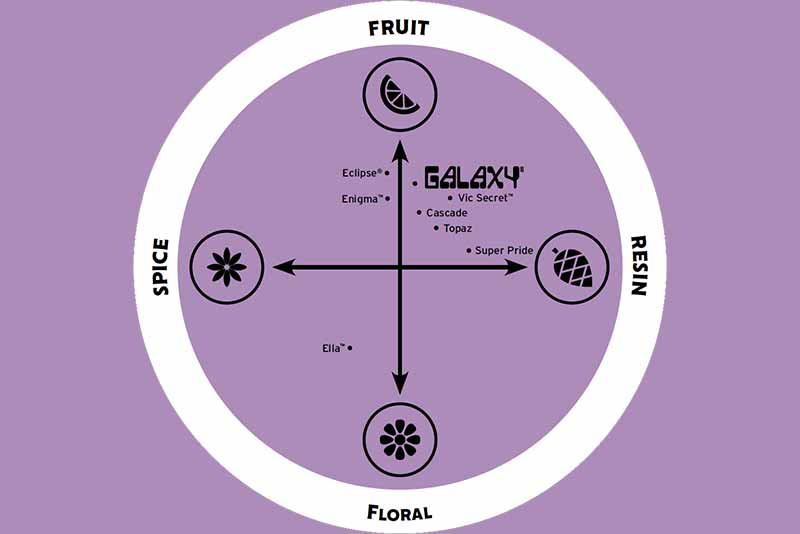
Photography courtesy of Hop Products Australia
HPA breaks down the hop in a four-point compass scale with fruity to the north and floral to the south, and spicy to the west and resiny to the east. Galaxy lies on the lightly resiny and extremely fruity end of the scale.
Johnston says Galaxy hops deliver a “big impact of passionfruit and peach” as well as citrus flavor in beers.
“It’s right in the consumer acceptance space,” he says. “That means brewers have successful beers placed in the market because that flavor profile is delicious.”
Those like Larry Sidor, founder of Crux Fermentation Project in Bend, OR, who experimented with Galaxy early on in its development.
Sidor says when HPA first sent him samples of Galaxy, he thought, “Wow, these are incredible.”
“They filled a void that didn’t exist,” Sidor told Hop Culture for another piece on Galaxy. “When I got a hold of Galaxy, it was the first time a whole lot of tropical fruit, passionfruit, really came through.”
Johnston says the feedback HPA received centered on Galaxy’s absolute impact. “You put in a little bit; you got a lot out,” he says. “There was a high preference for this peachy, tropical thing Galaxy brought.”
A characteristic of Australian cones now, tropical-forward hops didn’t exist then.
To this day, Sidor cites Crux Fermentation’s very first beer with Galaxy, Cast Out, as one of his all-time favorites.
Crux specializes in beers that surprise and delight, enticing you to take one sip and then another. According to Sidor, Galaxy provides that clean bitterness where “you’ll drink it and go, wow, this is good, take another sip, and as it warms up, you’ll get more … watermelon,” Sidor says, noting other descriptors such as tropical fruit, passionfruit, and guava.
Beers just pop with Galaxy, but it does take a nuanced hand to coax out that flavor.
Where in the Brewing Process Should You Use Galaxy Hops?
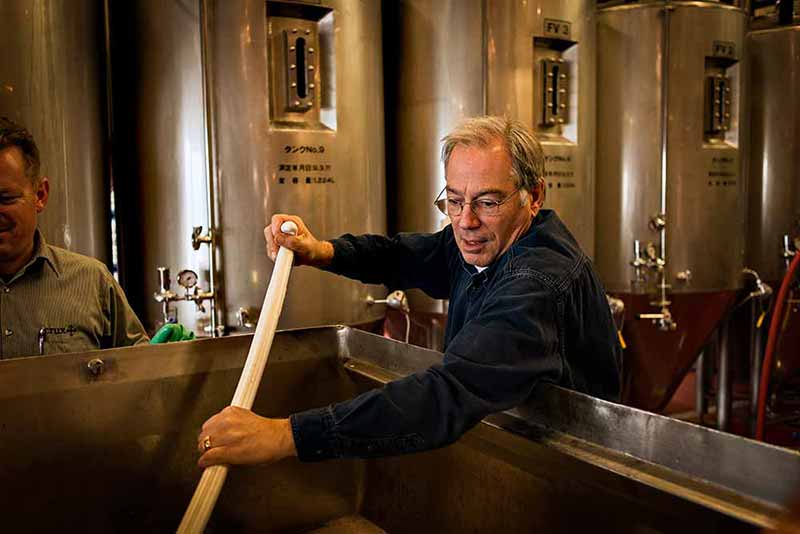
Photography courtesy of Crux Fermentation Project
Despite the high alphas, Johnston doesn’t think Galaxy does well as a kettle hop charge.
“I don’t think it’s a great bittering hop,” he says, adding, “Though they made those, they didn’t select it for bittering purposes for fair and reasonable reasons.”
Where it does well, however, is post-boil in the whirlpool or later, Johnston says.
“It does make an astounding impact and [should] be used later in the process, especially in the cold side,” Johnston says.
He notes that if used in a beer with a mix of hops, Galaxy will “poke its head up in the flavor profile.”
For Cast Out, Sidor hops aggressively in the hop back and dry hopping stages to achieve a balanced, clean expression of Galaxy.
“With Galaxy, it has a pretty clean bitterness,” says Sidor, noting that Cast Out hits pretty high at 60 IBUs, so it will be bitter but still makes you want to go back for another sip. “Except for the 7% ABV, I can drink quite a few of them!”
Which Style of Beer Works Best for Galaxy Hops?
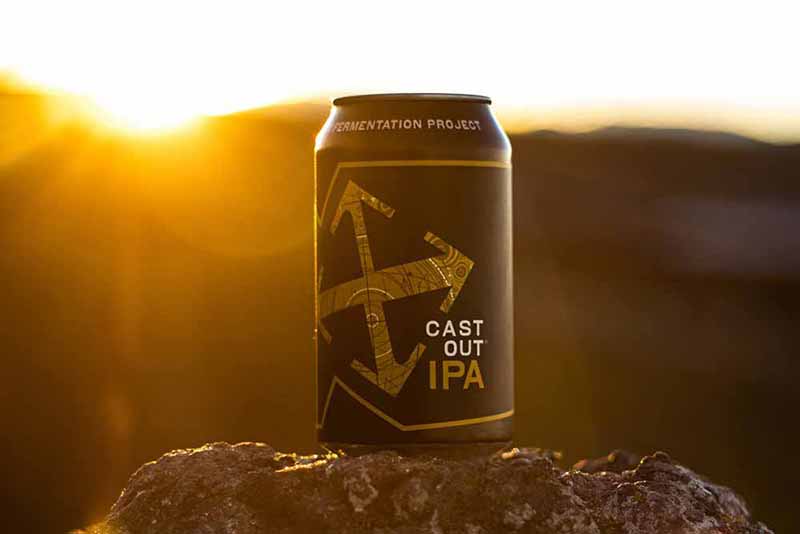
Photography courtesy of Crux Fermentation Project
While brewers make a concerted effort to use Galaxy hops in IPAs and double IPAs, Johnston says the hop can stand out in more than just that one style.
“It’s just in people’s top of mind … how they think it’s an IPA hop or it’s a high-impact hop for high-impact beers or high-alcohol beers,” Johnston says. “I think that’s where people are being a little narrow-minded about the use of their Galaxy hops.”
Johnston adds that Galaxy can work quite well in lighter beer styles at or under 5% ABV.
“There are opportunities for Galaxy to express its flavor profile in its delicate form, not in its preponderance,” he says. “There’s talk of a resurgence of craft lager and always the moderation of alcohol levels in different settings. I think Galaxy has an exceptional outlook, even in lighter alcohol settings.”



